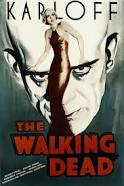
“You take away my life and offer me a favor in return. That’s what I call a bargain.”
John Ellman (Boris Karloff) has only been out of prison two weeks. He accidentally killed a man 10 years ago. And now he has been framed for the murder of Judge Shaw by a gang of racketeers. Shaw is the judge that sent him to prison. He is unfairly tried and found guilty. Two witnesses finally come forward but John’s lawyer is crooked and John is sent to the electric chair and executed.
Dr. Evan Beaumont (Edmund Gwenn) retrieves John’s dead body and revives it. He is experimenting on reanimation. He wants to discover what happens after death. Although John has no memory of who framed him he seems to have an unusual insight on those that are responsible.
Whenever John confronts each of his framers he does nothing to actually harm them, but some freak event of nature happens and each man meets with a fatal accident. He only asks them why they wanted him killed. Each man dies before John can get an answer. It seems as if each man’s guilt has brought about their own destruction. The only man that Ellman actually killed was the accidental death of the guy that landed him in prison to begin with. All the others technically killed themselves. And each one dies differently. Kind of “Final Destination” but on a tiny scale.
It’s a little bit of “Frankenstein” (1931) with its electricity and mad scientist gadgets. To add to it Karloff looks more like Frankenstein after he is brought back to life than he did before he was sent to the electric chair. It’s also a little bit of “The Man They Could Not Hang” (1939) with the use of a mechanical heart (the Lindbergh heart) to revive a patient. Woven into it is also a spiritual feeling. What happens after death? How does the mind react when the body is no longer functioning?
“The Walking Dead” is a Warner Brothers production directed by Michael Curtiz. It’s a short movie, only about 66 minutes so it doesn’t waste any time. It was released in 1936. It’s just different enough to add a refreshing touch to the return from the dead genre. Karloff does a wonderful performance of a man possessed by his own dead spirit. It’s a small gem of a movie, but one worth watching if you can find it.
Charles Lindbergh (yes the pilot) became interested in cardiology because of his sister-in-law Elisabeth’s battle with heart disease. He teamed up with Nobel Prize-winning French surgeon Alexis Carrel in the early 30s working on a method for keeping organs alive outside the body. By 1935, Lindbergh had developed a perfusion pump made of Pyrex glass that was capable of moving air and life-giving fluids through excised organs to keep them working and infection-free. The pump was hailed as a medical breakthrough, and helped pave the way for the development of the first true artificial organs. The heart, however, was never used to bring someone back to life. In 1938 Lindbergh and Carrel coauthored a book on the subject called “The Culture of Organs.”

